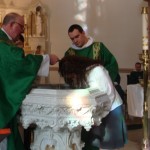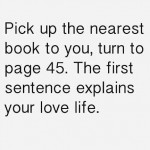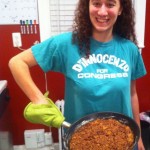
This weekend, I’m hosting an in-person discussion of “the Benedict Option” — ways for modern Christians to root their faith so that they can wind up living it more fully and more joyfully. Rod Dreher is the biggest promoter of the idea, which takes its name from the Benedictine monasteries that acted as centers of Christian faith, both for the monks that lived within them and (more relevantly for me!) the lay communities that sprang up in the shadow of the monasteries. These ordinary people had the chance to be nourished by the monks while remaining more entangled with the rest of the world.
At my discussion group this weekend, we’re going to try to stay focused on the practical (as Noah Millman wishes), thinking about changes we might make or projects we could start in the next six to twelve months that could help us support each other more, live our faith exuberantly, and, basically, extend the feeling I’ve had at some Dominican-run events, “spaces where joyful piety happens to you more often; a few spaces where your Catholicism doesn’t feel like an act of resistance, any more than eating does.” I’m sure I’ll post on some of the practicalities after the event, but, in the meantime, I’ve just got a little more on the theory.
I kinda liked Alan Jacobs’s choice of metaphor to explain why returning/building a community doesn’t need to be a matter of fleeing or rejecting the world:
But here’s the key thing. What do they always tell you before the plane takes off?Secure your own oxygen mask before assisting others. When Christians stride confidently out to change the world without having first taken care to be fully shaped and formed by the Christian account of things, they (a) have very little that’s distinctive to offer others and (b) are themselves easily swayed by thoroughly non-Christian ways of thinking and acting, with results we have recently had thoroughly documented for us.
Ultimately, whatever specific form the Benedict Option takes, this is what it’s about: securing our own oxygen mask first before attempting to assist others.
My main problem with it is the background image of a plummeting plane. The oxygen mask idea is a little too tinged with catastrophe; it makes it sound like Benedict Option-style thinking is a response to exceptional, apocalyptic circumstances (and that framing tends to divert everyone into discussing the crisis-or-lack-thereof, not the response).
Instead, I’d like to borrow from Edwin Abbott’s (author of Flatland!) theological book, The Kernel and the Husk where he writes:
Those who live in the stir of cities where they are doomed never to be alone, never to realize perfect silence, never to see more than a few square feet of sky, are living as the Word of God did not intend them to live; they may have–they often have–great spiritual compensations; they certainly have some spiritual disadvantage in these unnatural negations.
People don’t just need oxygen or community in a crisis — they need these things simply to live. An environment of “unnatural negations” is stunting. There are people like hermits or stylites (people living on top of poles or promontories) who live without the kind of community, shared events, and support centered on Christian faith that the Benedict Option is meant to help supply. but those people aren’t amateurs.
Living a Christian life on your own is something people had to discern and prepare for. Often, monks needed the permission of a superior if they wanted to go off into the desert alone. Unfortunately, it’s easy for Christian laypeople to wind up as accidental stylites — living their faith alone, without the guidance, affection, rhythms, or shared enthusiasm that would result from living in community. As I see the Benedict Option, it’s a way to prevent that from happening, to make sure that Christians clear space for some distinctly Christian communal spaces, so that your faith isn’t confined to your pew, your room, and the inside of your own head.
So far, in my own life, that’s been a matter of inviting people to movie/discussion nights (Ida, Of Gods and Men), suggesting we pray Night Office together at the end of events or on walks home from pubs, and holding discussion groups like the one this weekend on the Benedict Option. I’m looking forward to seeing what suggestions the other attendees come up with, especially slightly larger ones that would depend on 2-4 people to make them work, instead of one person alone.












